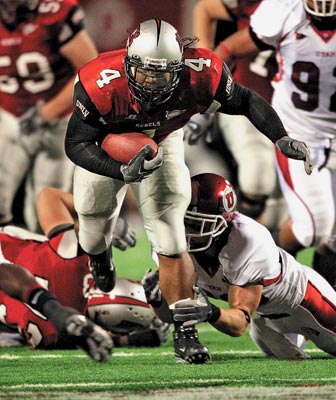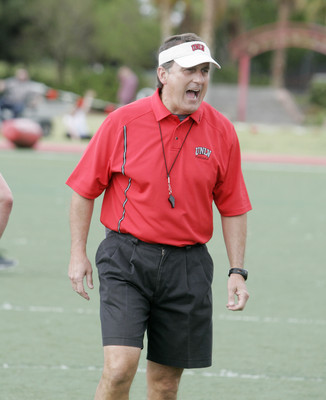Program still not on firm footing
Fresh off his third straight two-win season as UNLV's football coach, Mike Sanford will soon decide whether to make changes to his staff, his defense and potentially every part of the Rebels' struggling program.
Change is almost certain after a 2-10 season, which dropped Sanford's UNLV record to 6-29, and a third straight last-place finish in the Mountain West Conference.
Sanford answered questions Monday about the state of the program.
Review-Journal: How do you convince fans the program is on the right track?
Sanford: We were a young program this year, a young football team, young quarterback. And that was the bad news. The way the season went, that had a lot to do with that. But the good news is we've got a lot of those guys back, and I think there are a lot of good young players in that group.
We had to play with two freshman quarterbacks, but at the same time, they both got a lot of experience. And we've got great competition going into the spring with Omar Clayton and Travis Dixon, and then add to that mix (redshirt freshman) Mike Clausen, who I think is going to be a real competitive guy in that group.
And then we've got 10 out of 11 starters coming back on offense. You've got seven out of 11 coming back on defense, which is a total of 17 out of 22 starters coming back. I think those are positive things, and I think although the season has been very disappointing for me and for all of us, there is hope and there are positive things about the future. I think an important factor, too, is the players are excited about the future. I think they see there are good players in this program.
R-J: Do you think it's going to take actually winning games to convince most fans?
Sanford: I think there are some people that really see us and know us and expect us to win games, and I think there's a large element out there that we've got to convince by winning. I know that's part of the deal, and I completely understand that. We have a sense of urgency, tremendous sense of urgency to win.
R-J: Why hasn't the program progressed further?
Sanford: Just looking at this season, even though the bottom-line record is not indicative of improvement, I do believe if you look at three out of our first four games, we won two of them, we came very close to knocking off Wisconsin, a Big Ten opponent, (and lost) to a team that's going to go to the BCS in Hawaii.
I think we were poised to go over the top, and for some reason we hit an obstacle, road block in getting over the top. After that point, we continued to play some very competitive games to the point where we were in the game and had a chance to win.
We just lost some juice as the season went on toward the end because of our youth and our depth.
R-J: How important was it to have athletic director Mike Hamrick stand behind you?
Sanford: Very important. I think that was huge, and it is huge. And I think that also is important for recruiting.
R-J: Would you have brought yourself back?
Sanford: Yeah, because I know the future is bright.
R-J: How many games do you think you need to win next season?
Sanford: I'm not going to put a number on that at all because I think when you put a number on wins, you're deciding beforehand by people's perception which games you have a chance to win and which games you don't have a chance to win.
I'm talking in general in college sports, you can't do that because it creates that mentality that you're going to play really good against hard teams and you're going to play just OK against the teams as far as perception that you're supposed to (beat).
R-J: You mentioned the urgency before, though. You definitely have to improve next year, don't you?
Sanford: No question. I think we have to improve, and I have an expectancy that we're going to improve. I have a sense of urgency, this coaching staff has a sense of urgency, and these players -- we had a 7 a.m. meeting (Monday) -- and they got my point of a sense of urgency.
R-J: Are you a better assistant than a head coach?
Sanford: I've studied under a lot of good head coaches, and prepared to be a coach. I have tremendous confidence in myself as a head coach, and I think that will be proven out.
R-J: You've had success as a play-caller last year against Air Force and when you were the offensive coordinator at Utah. Should you take play-calling back?
Sanford: I'm not going to take play-calling back, but I'm going to be very involved.
R-J: Do you think play-calling needs to improve?
Sanford: In a season when you go 2-10, everything needs to be evaluated and everything needs to improve, so that would be one thing among a bunch of things. I think more important than play-calling is the execution of plays.
R-J: That was a bigger problem?
Sanford: Yes.
R-J: Why is that?
Sanford: If you have good execution and everybody executes properly -- all the players do what they're supposed to do -- you'll have successful plays no matter what you call.
R-J: How serious of an internal look will you take at what the staff can do better?
Sanford: Very serious.
R-J: Any possible staff changes?
Sanford: I'm going to evaluate it and make some decisions on whether there will be staff changes and what those are over the next 10 days.
R-J: You've tried to crack down on personal fouls. Why didn't at least some of the players get the message, and was there a discipline problem with any of these players?
Sanford: This football team is going to be much more disciplined next year, and I wouldn't say that we had a discipline problem. Penalties are not just an indication of discipline. I think we run a very disciplined program. I think penalties and personal fouls, people look at that and say that's an indication of a lack of discipline. This is a disciplined program as far as players doing what they're supposed to be doing, being where they're supposed to be on time, and as far making sure they're going to class.
On-field discipline, it was and it's going to continue to be huge focus of me and this coaching staff.
R-J: Will you look at even more severe penalties, maybe suspension for a half or even a whole game (as opposed to a quarter)?
Sanford: I thought we were pretty severe compared to what most people do this year, and I think there's a fine line. The No. 1 thing is we've got to stop it. Now, that being said, there are some guys that are hustling, hard-playing, play-to-the-whistle kind of guys, aggressive guys, and I don't want to take their aggressiveness away.
R-J: You've said earlier a couple of your players might have gotten a closer look by the officials, too.
Sanford: Yes, and that's their fault. They got disciplined for it, but we've got to keep doing it, obviously. We've got to be even tougher on them than we've been. I've never been around a program, I haven't been anywhere where you sit guys for penalties. Never. Anywhere. So I know we're doing something more than any program I know in the country.
R-J: You said after the New Mexico game, you've got to "recruit, recruit, recruit." How much of a talent upgrade do you need to make, and what are your priorities?
Sanford: I think we have some specific needs at some specific positions where there are guys who are going to have a chance to play right away. I think we need to get a speed-type receiver. We need to get a speed-type difference-making back to complement Frank Summers. I think Frank Summers is an excellent player and I love him, but he's going to be a senior next year.
I think we need to get a return man. It may come out of those two positions, but we may get a guy who's just a return man.
Safeties, very important. Defensive line, very important. And then, obviously, we've got to get a punter.
R-J: Is Las Vegas' reputation a hindrance?
Sanford: We have been recruiting and will continue to recruit high-character kids, and with high-character kids, parents have a concern about sending their son to Las Vegas. So a big part of our recruiting visit is getting the parents to come and to show them that their son can get a great education, be around good people, have a great football and college experience here at UNLV.
R-J: Going back to quarterback position, do you expect Rocky Hinds (knee) to return?
Sanford: He's having a doctor's appointment in conjunction with this time. I probably won't know for sure how that went for a little while, and we'll wait to see how that goes and based on that what Rocky wants to do. I have no idea.
R-J: You lose Beau Bell and Mi'Von James, the best defender and best cornerback. With the defense struggling with those two players, how will it be better without them?
Sanford: Obviously, Beau Bell is very difficult to replace, but I think we've got some really good linebackers that will step in and step up, and I think we've got a lot of competition at corner. Obviously, Mil'Von James had a really good year, but he went into the year competing for his job.
But we're going to change. There are a bunch of things that I'm going to change. I'm in the process of evaluating, and there is a bunch of things I'm going to change on defense. We're going to be different, better, and we're going to be able to stop the run, we're going to be able to tackle, and we're not going to give up big plays.
Contact reporter Mark Anderson at manderson@reviewjournal.com or (702) 387-2914.
UNLV Football























